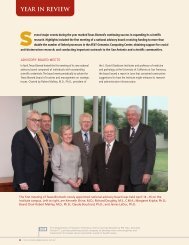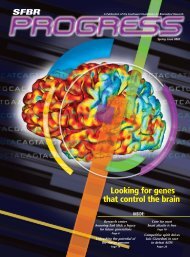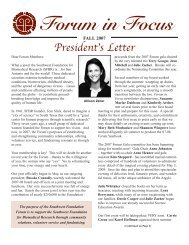Texas Biomed Science Report 2011-2012 - Texas Biomedical ...
Texas Biomed Science Report 2011-2012 - Texas Biomedical ...
Texas Biomed Science Report 2011-2012 - Texas Biomedical ...
Create successful ePaper yourself
Turn your PDF publications into a flip-book with our unique Google optimized e-Paper software.
Department of Genetics<br />
Ongoing research at the Department of Genetics focuses on the<br />
influence of genetic and environmental factors on heart disease, obesity,<br />
diabetes, psychiatric disease, parasitic infections, and osteoporosis.<br />
Researchers are also undertaking important work on the monogenic<br />
disorder cystinosis.<br />
Departmental scientists made major strides in advancing knowledge<br />
of the genetic determinants of complex diseases in <strong>2011</strong>. This progress<br />
was documented in 90 publications in the scientific literature and<br />
resulted in over $16.3 million in grant funding received during <strong>2011</strong>.<br />
Despite the poor funding climate at the National Institutes of Health<br />
(NIH), <strong>Texas</strong> <strong>Biomed</strong> geneticists received six new major grant awards<br />
from NIH during <strong>2011</strong>. Research in infectious disease genetics expanded<br />
significantly with two new NIH grants awarded to Tim Anderson,<br />
Ph.D. Anderson received support to find genes that are involved in<br />
resistance to artemisinin combination therapies, the primary treatments<br />
used for malaria caused by Plasmodium falciparum. His second grant<br />
was a new award to support research on schistosomiasis, one of the<br />
most significant parasitic infections in the developing world today.<br />
This novel project will characterize genes in schistosome parasites that<br />
influence snail-host specificity, and the development of the parasites<br />
within the snails that are critical to the schistosome life cycle.<br />
The Department has a major focus on psychiatric disease genetics,<br />
and this area of research was enhanced with a new NIH award to Harald<br />
Göring, Ph.D., for an innovative project that uses high-throughput gene<br />
expression analysis to identify the genes responsive to dopamine that<br />
influence risk of schizophrenia. Research on osteoporosis, another<br />
complex disease of great public health importance, benefited from a new<br />
NIH award to Lorena Havill, Ph.D., to support her study of genetic<br />
influences on bone structure and biomechanics in the baboon model.<br />
Expanding the Department’s research focus on diabetes, Jack Kent,<br />
Ph.D., received a new NIH grant to support his research focused on<br />
identifying genes involved in pathological response of the kidneys to the<br />
high glucose levels in diabetes.<br />
<strong>2011</strong>–<strong>2012</strong> Scientific <strong>Report</strong><br />
In addition, Eli Lilly & Company granted a major award that affects<br />
multiple programs in the Department of Genetics. This project will<br />
identify novel drug targets using a unique genetic approach. Deep<br />
sequencing of exomes in large Mexican American pedigrees will be used<br />
to identify rare protein coding mutations influencing lipid levels. The<br />
resulting exome sequencing data will be invaluable for numerous projects<br />
within the Department that are based on data from the Mexican<br />
American families.<br />
Department scientists had a number of important papers published<br />
during <strong>2011</strong>. Melanie Carless, Ph.D., and colleagues published results<br />
demonstrating that a gene previously identified as a schizophrenia risk<br />
gene also affects brain anatomy. Rohina Rubicz, Ph.D., and Harald<br />
Göring showed that human susceptibility to many common pathogens,<br />
including both viral and bacterial agents, is significantly heritable.<br />
In a paper based on data collected as part of the long-term study of<br />
heart disease in Alaskan Eskimos, Saroja Voruganti, Ph.D., Tony<br />
Comuzzie, Ph.D., and colleagues demonstrated that QTL influencing<br />
adiposity-related traits exhibited evidence of genotype-by-sex interaction.<br />
In a major breakthrough for the cystinosis research project, Katy Freed,<br />
Ph.D., John Blangero, Ph.D., and colleagues showed that three genes are<br />
disrupted in the common form of monogenic cystinosis. Previously, it<br />
had been thought that only two genes were disrupted in this devastating<br />
disease. This paper demonstrates that the primary disease-causing<br />
deletion also alters the TRPV1 gene. Interestingly, the newly implicated<br />
TRPV1 gene may be responsible for the common observation in<br />
cystinosis patients of reduced sensitivity to the heat in chili peppers.<br />
Research results also were presented in numerous talks, lectures and<br />
seminars presented by <strong>Texas</strong> <strong>Biomed</strong> geneticists at scientific meetings,<br />
and at research and educational institutions across the globe. These<br />
interactions with the scientific community furthered the international<br />
recognition of the Department for its work in the field of complex disease<br />
genetics, and led to the development of new research collaborations.<br />
7




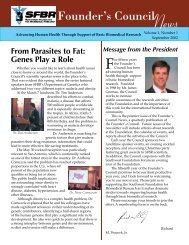

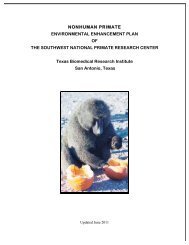
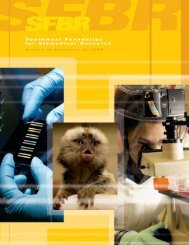
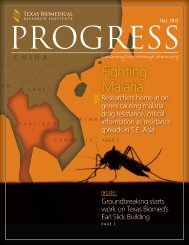
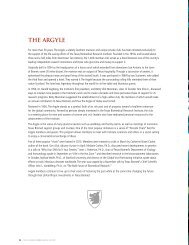
![Vol. 8 No. 2, 2011 [PDF] - Texas Biomedical Research Institute](https://img.yumpu.com/35688099/1/190x245/vol-8-no-2-2011-pdf-texas-biomedical-research-institute.jpg?quality=85)

